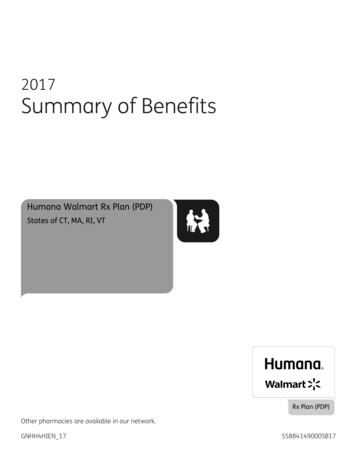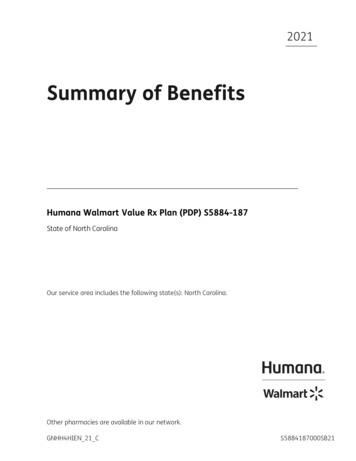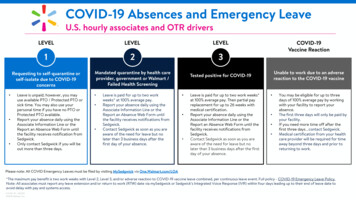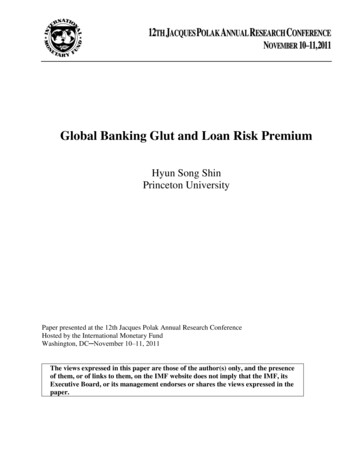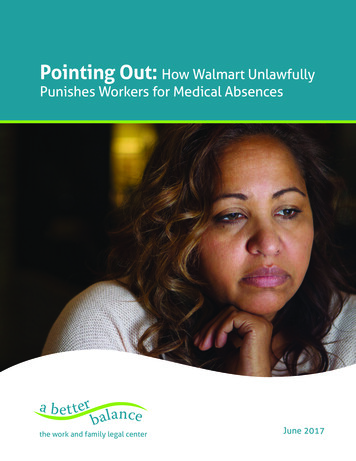
Transcription
Pointing Out: How Walmart UnlawfullyPunishes Workers for Medical Absencesthe work and family legal centerJune 2017
Pointing Out: How Walmart UnlawfullyPunishes Workers for Medical AbsencesBy Dina Bakst, Elizabeth Gedmark & Cara Suvall*Published by A Better Balance June 2017Table of ContentsExecutive Summary. 1Introduction. 3Our Approach. 6Attendance at Walmart. 6the work and family legal centerThe Point System. 7Excused Absences. 8The “Ostrich” Approach. 9Who We AreA Better Balance is a national legal advocacy organization dedicated to promoting fairness in the workplace. We helpworkers across the economic spectrum care for their families without risking their economic security. Through legislativeadvocacy, litigation and public education, A Better Balance leverages the power of the law to ensure that no workers haveto make the impossible choice between their job and their family. We believe that when all working parents and caregivershave a fair shot in the workplace, our families, our communities and our nation are healthier and stronger.Unrealistic Notice Requirement. 11Legal Protections. 12The Family and Medical Leave Act. 12www.abetterbalance.orgThe Americans with Disabilities Act. 21@ABetterBalancePregnant Worker Fairness Acts. 28https://www.facebook.com/ABetterBalance/Sick Time Laws. 30https://www.instagram.com/a better balance/In April and May 2017, A Better Balance and the OUR Walmart project of the Organization United for Respect (OUR)—a national non-profit organization dedicated to achieving economic stability and empowerment for the millions of people whowork in retail—worked together to survey more than 1,000 current and former employees about their experiences withsick time at Walmart. Those survey responses helped to inform this report and many examples are highlighted throughout.We are indebted to OUR Walmart for their collaboration and to the workers for being willing to share their experiences.* With appreciation for significant contributions by Molly Weston Williamson, Marcella Kocolatos, and Sarah Brafman.Recommendations. 34
from being disciplined or fired because oftheir disabilities. It also requires employers toengage in a good faith interactive process todetermine an appropriate accommodationfor workers with disabilities. Unfortunately,as detailed in this report, this is too oftennot Walmart’s practice. Other federal,state and local laws such as pregnancyaccommodation protections, and sick timelaws, could also be at play. Walmart’s policiesand practices are not in compliance withmany of these laws.Simply put: Giving a worker a disciplinary“point” for being absent due to a disabilityor for taking care of themselves or a lovedone with a serious medical condition is notonly unfair, in many instances, it runs afoul offederal, state and local law.Executive SummaryWalmart is proud of its heritage as afamily-founded company. Ironically, whilethe Walton family touts its family values,Walmart’s absence control program punishesworkers who need to be there for their ownfamilies. Walmart disciplines workers foroccasional absences due to caring for sick ordisabled family members and for needingto take time off for their own illnesses ordisabilities. Although this system is supposedto be “neutral,” and punish all absencesequally, along the lines of a “three strikes andyou’re out” policy, in reality such a system isbrutally unfair. It punishes workers for thingsthey cannot control and disproportionatelyharms the most vulnerable workers.Punishing workers for absences related toillness or disability is not only unfair, it’s oftenagainst the law. Based on our conversations1 Pointing Out 2017with Walmart employees as well as surveyresults of over 1,000 current and formerWalmart workers who have struggled due toWalmart’s absence control program, Walmartmay regularly be violating the federal Familyand Medical Leave Act (FMLA) by failingto give adequate notice to its employeesabout when absences might be protectedby the FMLA and by giving its employeesdisciplinary points for taking time to carefor themselves, their children, their spousesor their parents even though that time iscovered by the FMLA.We call on Walmart not only to follow the law,but to work with its employees who haveoccasional absences related to health anddisability. Walmart can do better, and Walmartmust do better. Workers and the advocatesstanding with them will not stop pushinguntil Walmart treats its workers fairly.We should not be punished with a pointagainst us when we are sick.—Anya,* IdahoI came down with a stomach flu and Ihad to call in due to vomiting and highfever and got a point cause of being sick.I hate the fact we got to worry aboutgetting fired cause we caught the flu.—Veronica,* IllinoisI was fired for caring too much for myloved one! I was there, loyal, for twenty-two years. Now my wife is gone, andI’m not working!—Carl,* KentuckyMy newborn son got put in the hospital for the RSV virus. I was told my jobshould be more important and come first. . . yeah, not over my child!—Laronda,* TennesseeSimilarly, we allege that Walmart’s policiesand practices of refusing to consider doctors’notes and giving disciplinary points fordisability-related absences is a violation ofthe Americans with Disabilities Act (ADA).The ADA protects workers with disabilitiesPointing Out 2017 2
IntroductionWalmart presents itself with a smile—butworkers there are not smiling. Employees (or“associates”) at Walmart work long, irregularhours for low pay and few benefits. Workingat Walmart can be a challenge. But whileemployees may wish the company weremore supportive, many are still grateful forthe job—they and their families rely on thepaycheck to keep a roof over their headsand food on their table. That is why it isparticularly devastating when Walmart—with its tremendous resources—chooses toadopt and promote corporate policies thattreat hard-working employees like they aredisposable.Walmart is a retailing giant. With 2.3 millionemployees around the world1 and totalrevenue of close to 486 billion in the mostrecent fiscal year,2 Walmart is the world’slargest company by revenue and theworld’s largest private employer. Here inthe United States, Walmart is the country’slargest private employer, with 1.5 millionassociates in 5,332 stores.3 Many Walmartsare located in the Southeastern United States,where there are 1,875 stores and 540,074employees.4 Walmart can have particularsignificance in rural areas, where there may1 Walmart 2017 Annual Report, p. 10, http://s2.q4cdn.com/056532643/files/doc financials/2017/Annual/WMT 2017AR-(1).pdf (last accessed May 16, 2017).2 Walmart 2017 Annual Report, p. 14, http://s2.q4cdn.com/056532643/files/doc financials/2017/Annual/WMT 2017AR-(1).pdf (last accessed May 16, 2017).3 Walmart 2017 Annual Report, p. 63, http://s2.q4cdn.com/056532643/files/doc financials/2017/Annual/WMT 2017AR-(1).pdf (last accessed May 16, 2017).4 This calculation includes Alabama, Arkansas, Florida, Georgia,Kentucky, Louisiana, Mississippi, North Carolina, South Carolina,Tennessee, Virginia, and West Virginia as of February 2017. WalmartCorporate, Our Locations, ns (last accessed May 16, 2017).3 Pointing Out 2017be few other jobs available. Despite itstremendous resources, however, Walmartmaintains punitive policies and practices thatdestabilize employees’ lives and push themout of work when they need a paycheck themost. Because Walmart is so large, it oftensets the standard for the entire retail industry.Pushing for change at Walmart can lead tobroader reforms for workers everywhere.This report is rooted in the experiences ofworkers around the country.5 It shows howWalmart’s “absence control program” 6— inwhich workers are given disciplinary “points”for absences that can lead to termination —punishes workers who are absent for medicalreasons, which are often emergencies, in away that we allege violates a number of laws.Many Walmart workers, who are strugglingto get by on Walmart hours and wages,live in fear that they are only one sick childor emergency room trip away from losingtheir job. Those who are most at risk areworkers with illnesses, disabilities, pregnancyrelated conditions, injuries or family healthemergencies.5 Some Walmart worker stories have been lightly edited for grammarand clarity. For those workers who wished to remain anonymous, apseudonym is indicated with an asterisk.6 Throughout the report, when we refer to Walmart’s absence controlprogram, we mean the practices and policies that are involvedin giving a “point” or otherwise disciplining a worker related toattendance. Our understanding of this program is based on ourconversations with Walmart workers and some written policies andinformation from Walmart, as accessed by Walmart workers. Nothing in this report is intended to represent the entirety of Walmart’scorporate or Human Resources policies or any statements byWalmart.My child got sick and had to go to thedoctor’s several times. The doctor’s officeis not open at night. Any time one of thekids get sick, I’m punished at work. I’m asingle mom with no one to help. Tryingto work and raise kids. Then work punishes me for being a good mom. Yay me.—Barbara,* KentuckyArleja’s StoryI was so excited to get my job at Walmart.I started as a Customer Service Managerat a Walmart Supercenter in Washington,D.C., in November 2015. I loved workingthere. It was a fast-paced and challengingPeople cannot predict when or how theyget sick. . . Most if not all Walmart employees fear losing their jobs because ofthis. . .—Karla,* TennesseeInstead of policies and practices that respondto the reality of employees’ lives with anysensitivity or flexibility, Walmart enforces itsstrict attendance control program in a waythat violates the fundamental dignity andhuman rights of its employees and, in somesituations, in a way that violates the law.Arleja’s story illustrates these issues precisely.environment. I worked overtime, and stillshowed up the next day eager to get backto work. It was rare for employees to getovertime and only the best workers receivedit—the fact that I was chosen made mefeel like I was valued and like I was part ofsomething. I found out in early January that Iwas pregnant with my fourth child.I excitedly told my co-workers my goodnews. Then, a week or so later, in the middleof my shift, I started having really painfulcramps and shooting pains in my stomach.I was doubled over in pain. A co-workerchecked on me, and I told her what wasgoing on. She told me that I should go tothe Emergency Room, even though thatwould mean that I would get a point forleaving work early. I called my doctor, whoalso said I should go to the hospital. But Icouldn’t afford to risk my job at Walmart,so I forced myself to work through the painPointing Out 2017 4
for the rest of my shift before going to theEmergency Room that night.Between the hospital, a follow-upemergency ultrasound, and a doctor’sorder to rest, I was out of work for thenext two days. I followed the proper callout procedure and told a manager that Iwould be out. I also wanted to make sureWalmart wouldn’t be short-staffed, so I tolda manager that I had arranged for one ofmy co-workers to substitute for me if thatwould be helpful, but they never followedup with him. I was given points for thosetwo absences. I got a disciplinary coachingfor attendance because I missed those twodays, and I told my manager that wasn’tfair because the two days were becauseof a medical emergency related to mypregnancy. I tried to hand in paperworkshowing that I had been at the hospitaland a letter from my doctor explaining thepregnancy complications I was having, butmy manager refused to take them. I askedthat she not hold those days against me,but she said there was nothing she coulddo, that they were unauthorized absences.I even went to the Store Manager to pleadmy case, but he said the same thing—thatthose absences couldn’t be authorized, andI had to be disciplined for them. Walmartpolicy.Unfortunately, in February, I started havingterrible pregnancy-related nausea. It was sobad that a few mornings I could not evenget out of bed. I couldn’t do anything. Whenthat happened, I tried bringing in notesfrom my doctor explaining that I was havingsevere nausea related to my pregnancy, but5 Pointing Out 2017again my managers refused to even look atthem. Soon after, I was fired for going overthe point limit for new hires because of myabsences related to the medical issues I washaving related to my pregnancy. I beggedthem to make an excuse for my absencesbecause there was nothing I could havedone about them and they were due tomy pregnancy, but I was told that underWalmart’s policies that simply didn’t matter.When I lost my job, I lost so much—it washard to get by, and I was so nervous thatmy kids and I would become homeless. Iwas good at my job at Walmart, and thatjob meant so much to me. Even now, Iwould go back to Walmart in a heartbeatif they apologized or acknowledged thatit was wrong that I was fired just for beingpregnant.Our ApproachIn November 2016, A Better Balance filed aclass-based “pattern and practice” charge ofdiscrimination with the Equal EmploymentOpportunity Commission (EEOC), allegingthat Walmart’s strict and punitive absencecontrol program unlawfully pushes employees,including Arleja, out of work. The chargealleges that Walmart’s absence controlprogram is illegal in some situations becauseWalmart refuses to consider doctor’s notes toauthorize absences or provide exceptions toits policies for reasons related to medical issuesand disabilities. These workers tell us a storywith a common theme: Walmart punished meand pushed me out of my job when I neededit most.In April and May 2017, A Better Balance andOUR Walmart worked together to survey morethan 1,000 current and former employeesabout their experiences with sick time atWalmart. The responses we received to thissurvey reinforced how difficult Walmart’sabsence control program makes life forworkers. Walmart’s policies and practices,including giving points for medical anddisability-related absences and refusing toconsider doctors’ notes, are widespread andconsistent around the country.Drawing on the real stories of Walmart workersaround the country, this report shines a lighton the devastating effects of the absencecontrol program. Disproportionately low-wageand women of color,7 these workers and their7 According to Walmart’s 2015 Diversity and Inclusion sion-report.pdf (last accessedMay 17, 2017) p. 7, women make up 57% of Walmart’s workforce,and people of color make up 40% of Walmart’s workforce. Womenand people of color are significantly less well-represented in man-stories all too often go unnoticed by policymakers, the media and the public at large.This report centers their experiences—themost powerful call for advancing change atWalmart and across the country. Finally, thisreport discusses the federal and state laws,such as the Family and Medical Leave Actand the Americans with Disabilities Act, thatprotect workers from being pushed out ofwork merely for needing some time off.I think it is ridiculous that work has tobe put first instead of human life. It is asad thing Walmart chose to punish theirassociates because of their absences dueto medical and sickness. . . But to me myfamily comes first when sick cause weonly have one life to live. Does Walmarthave no heart when it comes to sickness?—Maria,* TexasAttendance atWalmartWalmart has hundreds of different policies,many of which are not distributed toemployees but rather are available only onWalmart’s internal computer system, the Wire.We have heard from Walmart employees thatthey often do not know which policies applyto them; while technically these policies areavailable to Walmart employees, in reality,this system often works to keep employees inthe dark. Many employees are only permittedagement and salaried positions, so these numbers are much higherfor lower-paid hourly associate positions.Pointing Out 2017 6
to access the Wire while they are on theclock (sometimes with a manager hoveringnearby), and they are told that their use of theWire is logged by Walmart. This report doesnot attempt to comprehensively review allof Walmart’s policies. In this section, we willprovide basic information about Walmart’spolicies related to attendance and absencecontrol.I’ve called in sick I think three times lastwinter, but each time I’ve been told I’vejust ‘lost points’ (of which I have no ideawhat that means nor how to tell howmany ‘points’ I have). Therefore, I thinkI must be getting close to the ‘limit ofpoints’ so I just don’t call out sick anymore at all. For all I know, I might have aweek of paid sick leave, however no onewill show me how to see how many hoursI actually have, so I act like I have noneleft. . . It’s very easy to use them up tooquickly, thus I won’t use any more until Ihave an explanation.—Jackie*, CaliforniaThe Point SystemWalmart uses a point system to disciplineworkers. Walmart calls each point an“occurrence.” If you get too many points, thenyou are fired. Workers can receive points forany number of infractions—from talking backto a supervisor or taking too long during abreak, to working too slowly or being absentfrom or late to work.7 Pointing Out 2017Walmart gives workers disciplinary points forany time away from work that they consider“unauthorized.”My daughter was having seizures, I hadto take time off to monitor her. Theycounted it against me. . . I passed out atwork. They sent me to the hospital. Thenext day, they fired me for it. Walmart isa joke. People have lives outside of work,we get sick, we have children, thingshappen and Walmart literally coversNOTHING.—Allison,* OhioOne unauthorized absence is one point.According to Walmart, an absence meansworking less than half of your scheduled shift.So someone could get a full point even if sheworked almost five hours out of her ten-hourshift before needing to leave to take her childto the hospital. Showing up more than 10minutes late leads to half of a point.One no-call/no-show (meaning that theemployee did not call in to report theabsences at least an hour in advance) is fourwhole points. Someone who calls 45 minutesbefore their shift starts to explain that anemergency has just come up and they needto be absent would receive four points underthis policy.I got into a car wreck on my way towork and was sent by ambulance tothe hospital. I had two fractured ribsand a concussion. I reached a managerfrom the hospital, who said it would beok, and I came into work the next daywith wrapped ribs and a concussion.The front manager then said that theywouldn’t accept the doctor’s note fromthe hospital, and they fired me for missing that day.The strict occurrence limit is particularlychallenging for people with caregivingresponsibilities—people who need to carefor sick children, partners or parents—aswell as people with disabilities and medicalconditions that require them to occasionallymiss work without weeks of advance notice.—Megan,* OklahomaExcused AbsencesThose who have worked at Walmart forless than six months are terminated at fourpoints, and employees who have workedthere longer are terminated for nine pointsin a six-month rolling period.8 That means,for example, if an employee who has workedat Walmart for five months is heading towork 45 minutes before her shift when herdaughter starts throwing up and needs to behome from school, that employee would loseher job if she stays home with her sick child—even if she had not missed a single day andnever been even 10 minutes late the entiretime she worked there. It also means, forexample, that a ten-year Walmart employeewhose only attendance issue is being 11minutes late approximately once every threeweeks would be terminated for exceedingthe points limit (even if she regularly stayslate beyond the end of her shift). Even beforesomeone has four or nine points, they can stillreceive disciplinary “coachings” that remain inworkers’ files. Having any points or coachingson one’s record can prevent a worker fromgetting assigned additional hours or a muchneeded raise or promotion.8 The details of Walmart’s attendance policy may vary slightly bystate. The detail in this paragraph is from the current Washington,D.C., Attendance Policy (2016). It is our understanding from speakingwith workers and advocates that this attendance policy informationis consistent with typical attendance policies in other states.While Walmart’s attendance policy9 claimsto classify absences due to a “reasonableaccommodation” (a term of art from disabilitylaw) and some other reasons as authorizedand therefore not subject to discipline,workers still do receive points from managers.In a survey of over 1,000 Walmart workers,85.4% agreed with the statement: I thinkWalmart has a problem of regularly punishingpeople (eg. a point, occurrence, verbalwarning, firing, etc ) who have absencesdue to a disability or serious illness. Workersreported hearing the same thing frommanager after manager: there is no suchthing as an excused absence.9 Based on the Washington, D.C., Attendance Policy.Pointing Out 2017 8
My appendix ruptured while at workand because I already had eight points,I could not leave work to go to the ERwithout pointing out and losing my job.I should have been able to leave to goto the ER and not worry about losing myjob. I had even said to management, ‘Soif I fall out because of my appendix andhave to go out in an ambulance I willget a point and lose my job?’ The response from management was, ‘Yes.’—Sam,* KentuckyIn addition to company practice, Walmart’swritten policies, particularly those handed outto employees, can be profoundly misleadingand reinforce the idea that no absenceswill be excused. We have heard that whennew employees are trained at Walmart, theonly information they are given on paper isinformation related to when an employeegets points and what the point limits are,and that employees need to access thein-store online system the WIRE in order tofind out more about authorized absences. Inanother example, when Walmart changedsome of its attendance policies in early 2016,workers were given a Personal AssociateSummary Sheet (PASS), which they wererequired to sign, describing how the absencecontrol program worked. The PASS includedinformation about how points are accruedand the new limit at which workers are firedfor points, but contained no informationabout excused absences. By firmly remindingWalmart workers of the company’s strictattendance policy, without any explanation9 Pointing Out 2017of excused or authorized absences, it is nowonder that Walmart workers live in fear oflosing their jobs when illness strikes them or amember of their family.I think Walmart has a problem ofregularly punishing people whohave absences due to a disability orserious illness85.4% AGREE14.6% DISAGREEThe “Ostrich” ApproachAnother aspect of Walmart’s approach toits absence control program is that Walmarthas a practice that seemingly attempts toinsulate managers from finding out thatworkers are absent for reasons that may beprotected by law. According to Walmartworkers around the country, managers donot consider doctors’ notes from employees.When employees try to avoid a point bybringing in a note showing that they wereat the doctor for their child, or were in theemergency room for themselves, Walmart’spolicy and practice is to not consider thecontent of the note in deciding whether totreat the absences as unauthorized. Managersoften refuse to even look at or physically takea note. Thus, the proof that the employee wastelling the true reason for their absence oftendoes not go into their file and Walmart canclaim they did not know about this reason.I was vomiting blood and had to go tothe ER. I was there for two days and eachday was a point. I then had two daysoff, and I brought my hospital notes inwhen I went back. They would not acceptthem.—Leah,* KentuckyInstead of considering why employeeswere absent—and, as discussed below,letting workers know whether the reasonsfor their absences might be protected bylaw—Walmart too readily closes its eyes tothe reasons behind employees’ absences.Walmart’s practice of refusing to considerdoctors’ notes or to listen to the reasons whyemployees are absent could be a concertedeffort to avoid hearing information thatcould trigger legal responsibilities. But thatapproach doesn’t work.I had a stomach bug, nothing I ate ordrank would stay down. Was out fortwo days (couldn’t risk more). When Ireturned to work, management asked ifI knew how many absences I had. ‘Yes, Iknow.’ She said I could bring in doctor’snotes if I wished but they wouldn’t excuse the absence.—Naomi,* VirginiaWalmart’s “ostrich approach” means thatWalmart puts its head in the sand to avoidseeing FMLA and ADA violations, paid sickday violations and pregnancy discrimination,but those issues are still there in the livesof its employees. Sometimes, Walmarttries to outsource its legal responsibilitiesto a company called Sedgwick, whichseemingly handles many, if not most, ofWalmart employees’ requests for reasonableaccommodations, leaves of absence andother absence authorizations. For example,Walmart sometimes tells employees withabsences of more than three days to contactSedgwick for a “leave of absence,” withoutexplaining what Sedgwick exactly does, whatWalmart’s policies are and which laws mayprotect an employee from being punished forattendance-related issues. Employees aroundthe country agree that dealing with Sedgwickis rarely helpful—it’s slow, unresponsive andconfusing to deal with.I asked for two weeks off to receivemental health treatment. Sedgwickfinally got back to me within the last48 hours of my requested leave, which Ihadn’t taken because it wasn’t approved.Thanks, Sedgwick.—John,* CaliforniaThe responsibility of following the lawwhen it comes to employees’ absences restson Walmart and Walmart alone. Walmartcannot avoid legal obligations by refusingto consider doctors’ notes and informationabout absences, and it cannot push thatresponsibility onto someone else.Pointing Out 2017 10
Unrealistic NoticeRequirementWalmart’s attendance policy makes it almostimpossible for employees to get absencesapproved in advance even when employeestell supervisors about them weeks ahead. Thepolicy requires:(1) that an employee notify managementthree weeks in advance of an absence;and(2) that management approve thatabsence; and(3) that management choose to build therequested absence into the schedulein order for an absence not to count againstthem.That means, for example, if an employeehas a child who needs to have a follow-updoctor’s appointment during work hours intwo weeks (or even 20 days), there is no waythat he can get an absence excused for thatday even with the long lead time and even ifhe were to arrange with a co-worker to takeover the shift. It is often impossible to requesttime off three weeks in advance, especiallyfor unpredictable personal or family needs,but even for foreseen reasons. For example,someone who almost always is scheduledto work nights might make a doctor’sappointment for during the day, only to findout that they have been put on the schedulefor a day shift. Since managers sometimes failto post schedules three weeks in advance,it may be too late to request time off underthe policy and too late to get a new doctor’sappointment that doesn’t interfere with a shift.11 Pointing Out 2017Of course, emergency situations would neverbe authorized under this unrealistic threeweek advance notice requirement. The surveyresults indicated that 78 percent of thosewho were absent for a medical emergencywere also punished for an absence.allergic reaction and I had to rush herto the hospital and miss work. Becauseof this, I lost my job. I loved my job andI lost it and lost my place because Icouldn’t find work soon enough. I amnow homeless. I wish Walmart didn’thave such a horrible attendance policy. Ialways showed up on time and was oneof their good employees.—Nicole,* Texas22%78%PUNISHED NOT PUNISHED78 percent of workers who wereabsent for a medical emergency werealso punished for an absenceMy eight-month-old daughter got pneumonia in January 2017. I am a singlemom and no one could watch her, so Ihad to take a week off work while shewas recovering. I took in a note fromthe hospital and my manager said theywould take me off the schedule, but theynever did and I got points for being out.Then in February, my daughter had anMy mother has a degenerative disc disease of the spine, she sometimes needsto be taken to her doctor’s a
Pointing Out 2017 2 Walmart is proud of its heritage as a family-founded company. Ironically, while the Walton family touts its family values, Walmart's absence control program punishes
